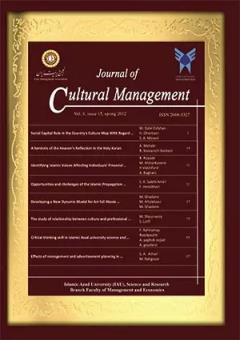Conceptual analysis of cultural activity, based on entities of the cultural project
Subject Areas : Journal of Cultural ManagementAliakbar Baghaie 1 * , Abasali ghayoomi 2 , sayed reza salehi amiri 3
1 - Ph.D. candidate in Cultural management and planning, Science and Research Branch
2 - Associate Professor of Cultural management and planning, Department of Cultural management, Faculty of Management and Economics, Science and Research Branch, Islamic Azad University, Tehran, Iran.
3 - Associate Professor of Cultural management and planning, Department of Cultural management, Faculty of Management and Economics, Science and Research Branch, Islamic Azad University, Tehran, Iran.
Keywords: Ontology, Cultural activity, Cultural operation, Cultural project, meta-synthesis,
Abstract :
Context and Purpose: One of the most important efforts in every scientific and practical field is to disambiguate and clarify the concepts and vocabulary of that field. Because when the concepts under a topic are ambiguous, the descriptive sentences, explanatory sentences and prescriptive sentences of that field will also be ambiguous and rather useless. Accordingly, one of the basic challenges of the cultural management branch is defining the concept of cultural activity. Accepting this importance, this article tries to analyze the concept of cultural activity by emphasizing the ontological efforts of the cultural project. Research method: In this research, the stage of data collection and selection was done based on the library method and systematic review. The stage of data analysis and synthesis has been done based on the meta-synthesis method according to the seven-step model of Sandelowski and Barroso. MAXQDA software tool has been used to implement this technique. Results: Among the reviewed models, methods and methodologies, 10 cases were selected to perform meta-synthesis. The implementation of meta-synthesis led to the identification of 12 main entities for the cultural project. The entities counted were analyzed in terms of the ability to differentiate cultural activity from others, and five entities of problem, strategy, audience, product and value were identified as having this ability. Conclusion: By analyzing and comparing the definitional structure of the selected entities, three identifiers of target-problem, human-audience and product-value have been introduced as distinguishing identifiers of cultural activity.
جکسون، مایکلسی. (1395). تفکر سیستمی، کلگرایی خلاق برای مدیران. ترجمه تقیناصر شریعتی. نشر سمت.
چکلند، پیتر و پولتر، جان. (1389). یادگیری برای عمل. ترجمه محمدرضا مهرگان و همکاران. تهران. مؤسسه کتاب مهربان نشر.
حبیبی یدالله، عیوضی یاور و معظمی گودرزي ابراهیم. (1396). مسئله فرهنگی و مسئلهشناسی فرهنگی ایران (در دیدگاه نخبگان دانشگاهی و حوزوي داخلی). فرهنگ در دانشگاه اسلامی. 7(4). 525-550.
سلتیز، کالیر، یهودا، مری، دش، مورتن و کوک، استوارت. (1346). روشهای تحقیق در علوم اجتماعی. ترجمه خسرو مهندسی. تهران. انتشارات موسسه مطالعات و تحقیقات اجتماعی.
سند الگوی اسلامی ایرانی پیشرفت. (1397).
شرکت اکسلوس. (1399). مدیریت پروژه های موفق با پرینس 2. ترجمۀ سیامک حاجییخچالی و علی مقدسی بردر، تهران: نشر آدینه.
شعارینژاد، علیاکبر. (1375). فرهنگ علوم رفتاری. تهران. انتشارات امیرکبیر.
طالب، مهدی. (1368). اهمیت مفاهیم و اصطلاحات در جامعه شناسی. رشد آموزش علوم اجتماعی. 1(1). 11-6.
فاضلی نعمتاله. (1394). مسئله چیست؟ مسئلهشناسی فرهنگی با رویکرد مطالعات فرهنگی. معاونت پژوهشهای اجتماعی-فرهنگی مرکز پژوهشهای مجلس شورای اسلامی.
کاتلر، فیلیپ و آرمسترانگ، گری. (1393). اصول بازاریابی. ترجمۀ فروزنده، بهمن. تهران: ادبستان.
مؤسسه مدیریت پروژه پیامآی. (1398). راهنمای پیکره دانش مدیریت پروژه (ویرایش ششم). ترجمه ابراهیمی، مهدی و بیاتی، علی و صمیمی، محمدرضا. تهران. آریانا قلم.
ویلیامز، باب و هاملبرونر، ریچارد. (1393). روشهای کاربردی در تفکر سیستمی. ترجمۀ عادل آذر و سعید جهانیان، تهران: نشر صفّار.
Barroso, J., Gollop, C. J., Sandelowski, M., Meynell, J., Pearce, P. F., & Collins, L. J. (2003). The challenges of searching for and retrieving qualitative studies. Western journal of nursing research, 25(2), 153–178. DOI:10.1177/0193945902250034.
Checkland, P. (1999). Systems Thinking, Systems Practice: Includes a 30-Year Retrospective. New York: Wiley.
Checkland, P., Poulter, J. (2006). Learning for Action: A Short Definitive Account of Soft Systems Methodology and Its Use for Practitioners, Teachers and Students. New York: Wiley.
Checkland, P., Scholes, J. (1990). Soft Systems Methodology in Action. New York: Wiley.
Cooper, H. (2016). Research Synthesis and Meta-Analysis: A Step-by-Step Approach. London: SAGE.
Daniels, H. (2004). Cultural historical activity theory and professional learning. International Journal of Disability, 51(2). 185-200. DOI: 10.1080/10349120410001687391.
Estabrooks, C. A., Field, P. A., Morse, J. M. (1994). Aggregating Qualitative Findings: An Approach to Theory Development. Qualitative Health Research. 4(4). 503-511. DOI: 10.1177/10497323940040041.
Foot, K.N. (2013). Cultural-Historical Activity Theory: Exploring a Theory to Inform Practice and Research. Journal of Human Behavior in the Social Environment, 24(3). 329-347. DOI: 10.1080/10911359.2013.831011.
Jackson, M. C. (1999). Towards Coherent Pluralism in Management Science. The Journal of the Operational Research Society, 50(1), 12–22. DOI: 10.2307/3010384.
Jackson, M. C. (2003). Systems Thinking: Creative holism for managers. New York: Wiley.
Jackson, M. C., Keys, P. (1984). Towards a System of Systems Methodologies. The Journal of the Operational Research Society, 35(6), 473–486. DOI: 10.2307/2581795.
Maurya, A. (2012). Running Lean: Iterate from Plan A to a Plan That Works. California: O'Reilly Media.
Osterwalder, A. (2004). The Business Model Ontology-A Proposition in a Design Science Approach. PhD Thesis. University of Lausanne, Switzerland.
Osterwalder, A., Pigneur, Yves. (2010). Business Model Generation: A Handbook for Visionaries, Game Changers, and Challengers. New York: Wiley.
Pericles, S. G. (2011). Implementation Of Interactive Planning. Master of Science Thesis. The University of Pennsylvania.
Project Management Institute. (2017). Guide to the Project Management Body of Knowledge (PMBOK® Guide)–Sixth Edition. Pennsylvania: Project Management Institute.
Roth, W., Radford, L., LaCroix, L. (2012). Working With Cultural-Historical Activity Theory. Qualitative Computing: Diverse Worlds and Research Practices. 13(2). DOI: 10.17169/fqs-13.2.1814.
Sandelowski, M., Barroso, J. (2006). Handbook for synthesizing qualitative research. New York: springer.

